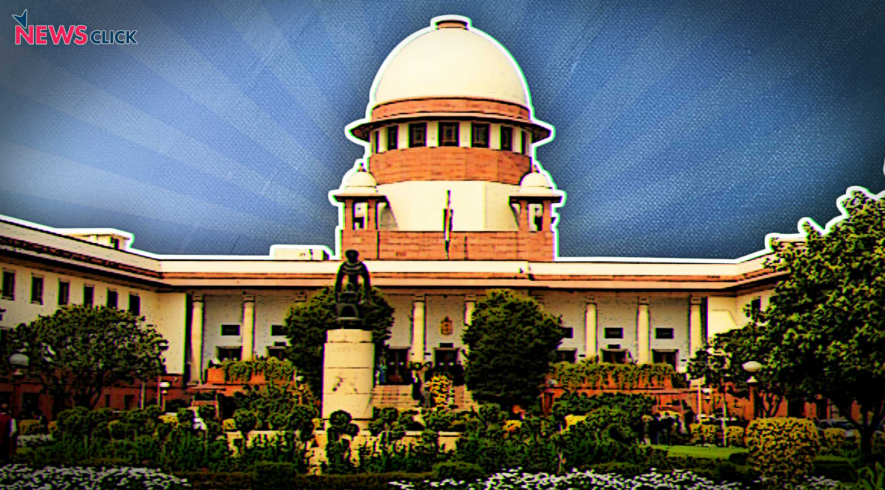SC Refers Delhi Govt’s Plea Against Centre’s Ordinance on Services to Constitution Bench

New Delhi: A five-judge constitution bench will now hear the Delhi government's plea challenging the Centre’s May 19 ordinance which took away the control over services from the city dispensation and set off a fresh tussle between the two power centres.
The top court rejected the vehement submission of the Delhi government that there was no need for referring the matter to a constitution bench as it will “paralyse the whole system” during its pendency.
A bench comprising Chief Justice D Y Chandrachud and justices P S Narasimha and Manoj Misra said the larger bench will commence the proceedings after the hearing on the pleas challenging the abrogation of Article 370, which had bestowed special status on the erstwhile state of Jammu and Kashmir, gets over.
“We will refer it to the Constitution bench and give you (parties – Delhi government and the Centre) the liberty to move before us for the hearing after we finish the 370 (pleas on abrogation of Article 370). We will upload the order this evening... Meanwhile the pleadings have to be completed,” the CJI said.
During a brief hearing, the bench raised a query with regard to the ordinance and said it took away the control of services from the control of Delhi government.
The Constitution excludes three entries of List II (state list) related to police, law and order and land from the control of the Delhi government, it said.
"What you (Centre) have effectively done is that the Constitution says barring three entries, Delhi legislative assembly has the power. But, the Ordinance takes away Entry 41 (services) (of the List II) also from the power. That is the effect of Section 3A of the Ordinance,” the bench said.
Senior advocate Harish Salve, appearing for the Central government's point man Lieutenant Governor V K Saxena, referred to previous judgements and said for a union territory the state list becomes concurrent list and hence Parliament has power to legislate.
Salve justified the termination of services of 437 independent consultants appointed by the Delhi government by the orders of the LG. The Delhi government made “rank illegal appointments” of undeserving persons, who happened to be Aam Aadmi party workers, and they were terminated by the LG and for that the ordinance was not needed at all, he said.
Senior advocate Abhishek Singhvi, appearing for the Delhi government, said the reference of the case to a constitution bench was not needed as the matter can be decided by a three-judge bench.
The senior lawyer said the ordinance violated Article 239AA (which deals with special provisions with respect to Delhi) of the Constitution as it diluted the power of the elected government.
“The impugned ordinance abolishes the constitutional scheme. And 239AA(7) is not to change the Constitution itself, rather it is for facilitation,” Singhvi said.
He said referring the case to a constitution bench will paralyse the whole system and sought an early hearing of the Delhi government's petition.
Attorney General R Venkataramani said the decision to send a matter to a constitution bench entirely falls within the domain of the three-judge bench if it feels substantial questions of laws are involved.
Solicitor General Tushar Mehta appeared for the Centre.
The top court had earlier hinted that it was contemplating referring to a constitution bench for adjudication the Delhi government's petition against the Centre's ordinance.
"What they (Centre) have done is that by using power under 239AA(7), they have amended the Constitution to take services out of the Delhi government’s control. Is that permissible? I don't think either of the Constitution Bench judgements (on Delhi-Centre power row) has covered that,” the CJI had said.
"The point is this- Parliament has the power to enact a law under any entry in list 2 (state) or list 3 (concurrent). List 3 is concurrent. You have said by this clause 3A of the Ordinance that the state legislature cannot enact law under Entry 41 (State public services; State Public Service Commission) at all,” it had said.
Referring to the provisions related to the power of the Delhi government, the bench said the matters pertaining to land, public order and police of the State list are with the Centre, and by the present ordinance the control over services has also been taken away.
It had said since this issue was not for consideration before the two constitution benches in the past, it can be referred to a larger bench for adjudication.
The bench had recently issued notices to the Centre and the lieutenant governor on the plea while refusing to grant an interim stay on the ordinance on control over services in Delhi.
Article 239AA deals with special provisions with respect to Delhi in the Constitution and its sub-article 7 says, “Parliament may, by law, make provisions for giving effect to, or supplementing the provisions contained in the foregoing clauses and for all matters incidental or consequential thereto.”
It also says any such law made under the Article “shall not be deemed to be an amendment of this Constitution for the purposes of Article 368 notwithstanding that it contains any provision which amends or has the effect of amending, this Constitution.”
The Centre had on May 19 promulgated the Government of National Capital Territory of Delhi (Amendment) Ordinance, 2023 to create an authority for transfer and posting of Group-A officers in Delhi.
The Aam Aadmi Party (AAP) government termed it a "deception" with the Supreme Court verdict on control of services.
The ordinance, which came a week after the Supreme Court handed over the control of services in Delhi excluding police, public order and land, to the elected government, seeks to set up a National Capital Civil Service Authority for transfer of and disciplinary proceedings against Group-A officers from the Delhi, Andaman & Nicobar, Lakshadweep, Daman and Diu and Dadra and Nagar Haveli (Civil) Services (DANICS) cadre.
The chief minister is one of the three members of the Authority, while two others are bureaucrats. The decisions by the Authority are to be taken by a majority and, in the event of a dispute, the matter will be referred to the LG whose decision will be final.
Transfer and posting of all officers of the Delhi government were under the executive control of the LG before the May 11 top court verdict.
A five-judge constitution bench headed by Chief Justice D Y Chandrachud, in a unanimous verdict, had sought to put an end to the eight-year-old dispute between the Centre and the Delhi government triggered by a 2015 home ministry notification asserting its control over services, holding the National Capital Territory administration is unlike other union territories and has been "accorded a 'sui generis' (unique) status by the Constitution.
Against the backdrop of frequent run-ins between the AAP government and the lieutenant governor, the apex court had asserted an elected government needs to have control over bureaucrats, failing which the principle of collective responsibility will be adversely affected.
Get the latest reports & analysis with people's perspective on Protests, movements & deep analytical videos, discussions of the current affairs in your Telegram app. Subscribe to NewsClick's Telegram channel & get Real-Time updates on stories, as they get published on our website.
























